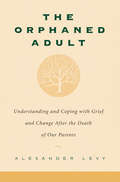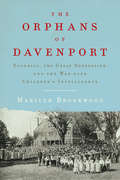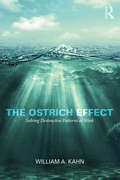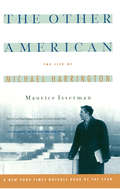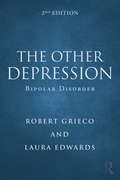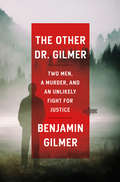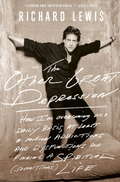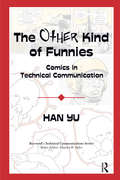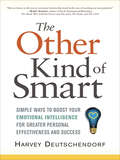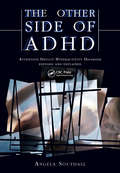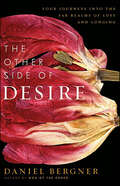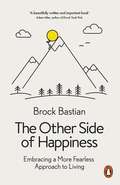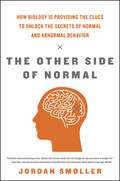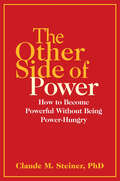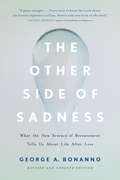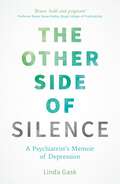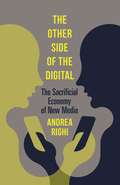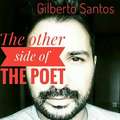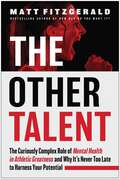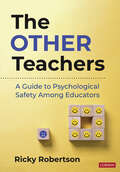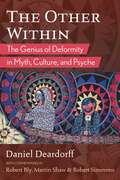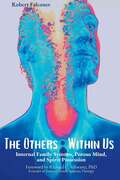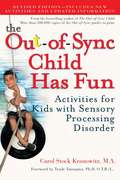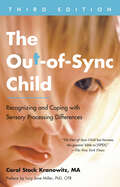- Table View
- List View
The Orphaned Adult: Understanding and Coping with Grief and Change After the Death of Our Parents
by Alexander LevyLosing our parents when we ourselves are adults is in the natural order of things, a rite of passage into true adulthood. But whether we lose them suddenly or after a prolonged illness, and whether we were close to or estranged from them, this passage proves inevitably more difficult than we thought it would be. A much-needed and knowledgeable discussion of this adult phenomenon,The Orphaned Adult validates the wide array of disorienting emotions that can accompany the death of our parents by sharing both the author's heart-felt experience of loss and the moving stories of countless adults who have shared their losses with him. From the recognition of our own mortality and sudden child-like sorrow to a sometimes-subtle change in identity or shift of roles in the surviving family,The Orphaned Adult guides readers through the storm of change this passage brings and anchors them with its compassionate and reassuring wisdom.
The Orphans of Davenport: Eugenics, The Great Depression, And The War Over Children's Intelligence
by Marilyn BrookwoodThe fascinating—and eerily timely—tale of the forgotten Depression-era psychologists who launched the modern science of childhood development. “Doomed from birth” was how psychologist Harold Skeels described two toddler girls at the Iowa Soldiers’ Orphans’ Home in Davenport, Iowa, in 1934. Their IQ scores, added together, totaled just 81. Following prevailing eugenic beliefs of the times, Skeels and his colleague Marie Skodak assumed that the girls had inherited their parents’ low intelligence and were therefore unfit for adoption. The girls were sent to an institution for the “feebleminded” to be cared for by “moron” women. To Skeels and Skodak’s astonishment, under the women’s care, the children’s IQ scores became normal. Now considered one of the most important scientific findings of the twentieth century, the discovery that environment shapes children’s intelligence was also one of the most fiercely contested—and its origin story has never been told. In The Orphans of Davenport, psychologist and esteemed historian Marilyn Brookwood chronicles how a band of young psychologists in 1930s Iowa shattered the nature-versus-nurture debate and overthrew long-accepted racist and classist views of childhood development. Transporting readers to a rural Iowa devastated by dust storms and economic collapse, Brookwood reveals just how profoundly unlikely it was for this breakthrough to come from the Iowa Child Welfare Research Station. Funded by the University of Iowa and the Rockefeller Foundation, and modeled on America’s experimental agricultural stations, the Iowa Station was virtually unknown, a backwater compared to the renowned psychology faculties of Stanford, Harvard, and Princeton. Despite the challenges they faced, the Iowa psychologists replicated increased intelligence in thirteen more “retarded” children. When Skeels published their incredible work, America’s leading psychologists—eugenicists all—attacked and condemned his conclusions. The loudest critic was Lewis M. Terman, who advocated for forced sterilization of low-intelligence women and whose own widely accepted IQ test was threatened by the Iowa research. Terman and his opponents insisted that intelligence was hereditary, and their prestige ensured that the research would be ignored for decades. Remarkably, it was not until the 1960s that a new generation of psychologists accepted environment’s role in intelligence and helped launch the modern field of developmental neuroscience.. Drawing on prodigious archival research, Brookwood reclaims the Iowa researchers as intrepid heroes and movingly recounts the stories of the orphans themselves, many of whom later credited the psychologists with giving them the opportunity to forge successful lives. A radiant story of the power and promise of science to better the lives of us all, The Orphans of Davenport unearths an essential history at a moment when race science is dangerously resurgent.
The Ostrich Effect: Solving Destructive Patterns at Work
by William A. KahnThe Ostrich Effect goes beyond the typical "how to" approach of most books that deal with difficult conversations at work. It aims to teach the reader what conversations to have, and when to have them, in order to solve destructive problems that occur in the workplace. Like the proverbial ostrich with its head in the sand, people often avoid confronting small issues at work, but, if avoided, these issues will escalate and inevitably wreak havoc. Drawing on a combination of social science research and Kahn’s practical experience as an organizational psychologist, the book examines the micro-processes that underlie the way in which these problems develop and flourish. These micro-processes are tiny, fleeting, and hardly noticeable, but when they are identified, something startling becomes apparent: there is a predictable pattern to this escalation. The book uses a variety of examples to demonstrate this pattern across a range of organizations and industries, and offers a toolkit to help guide the reader in resolving people problems at work. The toolkit focuses not on changing others, but on changing how we interact with others—our own behavior is the most powerful force for change that we have. The ostrich remains the symbol of those of us who foolishly ignore our problems while hoping that they will magically disappear. By identifying this "ostrich effect", the reader is empowered to re-frame and neutralize its impact.
The Other American
by Maurice IssermanMost Americans first heard of Michael Harrington with the publication of The Other America, his seminal book on American poverty. Isserman expertly tracks Harrington's beginnings in the Catholic Worke
The Other Depression: Bipolar Disorder
by Robert Grieco Laura EdwardsIn The Other Depression, Grieco and Edwards help people understand and destigmatize those afflicted with bipolar disorder. Topics discussed include the genetic signature and environmental stresses and underpinnings of this disease, along with how it alters the functioning of the brain, and how it can be treated. The authors also introduce resources available to bipolar people and their families and suggest strategies for coping and getting on with life.
The Other Dr. Gilmer: Two Men, a Murder, and an Unlikely Fight for Justice
by Benjamin GilmerA powerful true story about a shocking crime and a mysterious illness that will forever change your notions of how we punish and how we heal—an expansion on one of the most popular This American Life episodes of all time&“A remarkable medical detective story–cum–memoir, grippingly told . . . I was drawn in by every part of it.&”—Atul Gawande, #1 New York Times bestselling author of Being MortalFresh out of medical residency, Dr. Benjamin Gilmer joined a rural North Carolina clinic only to find that its previous doctor shared his last name. Dr. Vince Gilmer was loved and respected by the community—right up until he strangled his ailing father and then returned to the clinic for a regular week of work. Vince&’s eventual arrest for murder shocked his patients. How could their beloved doctor be capable of such violence? The deeper Benjamin looked into Vince&’s case, the more he became obsessed with discovering what pushed a good man toward darkness. When Benjamin visited Vince in prison, he met a man who appeared to be fighting his own mind, constantly twitching and veering into nonsensical tangents. Sentenced to life in prison, Vince had been branded a cold-blooded killer and a &“malingerer&”—a person who fakes an illness. But it was obvious to Benjamin that Vince needed help. Alongside This American Life journalist Sarah Koenig, Benjamin resolved to understand what had happened to his predecessor. Time and again, the pair came up against a prison system that cared little about the mental health of its inmates—despite more than a third of them suffering from mental illness. The Other Dr. Gilmer takes readers on a riveting and heart-wrenching journey through our shared human fallibility, made worse by a prison system that is failing our most vulnerable citizens. With deep compassion and an even deeper sense of justice, Dr. Benjamin Gilmer delves into the mystery of what could make a caring doctor commit a brutal murder. And in the process, his powerful story asks us to answer a profound question: In a country with the highest incarceration rates in the world, what would it look like if we prioritized healing rather than punishment?
The Other Great Depression: How I'm overcoming, on a daily basis, at least a million addictions and disfunctions and finding a s
by Richard LewisA new edition?now with a new Afterword?of the honest and hilarious recovery memoir by the famously neurotic comedian and regular guest star of the hit show "Curb Your Enthusiasm"
The Other Kind of Funnies: Comics in Technical Communication (Baywood's Technical Communications)
by Han YuThe Other Kind of Funnies refutes the mainstream American cultural assumption that comics have little to do with technical communication-that the former are entertaining (in a low-brow sense) and juvenile, whereas the latter is practical and serious (to the point of stuffiness). The first of its kind, this book demonstrates the exciting possibilities of using comics in technical communication. It defines comics as a medium and art form that includes cartoons, comic strips, comic books, and graphic novels; provides conceptual and historical backgrounds on comics; and discusses the appeals and challenges of using comics-style technical communication. More specifically, it examines comics-style instructions, educational materials, health/risk communication, and political/propaganda communication. The author argues that comics-style technical communication encourages reader participation, produces covert persuasion, facilitates intercultural communication, benefits underprivileged audiences such as children and readers of lower literacy, and challenges the positivist view of technical communication. An abundance of comics-style technical communication examples, carefully selected from across cultures and times, demonstrates the argument. While the book proposes that comics can create user-friendly, visually oriented, engaging, and socially responsible technical communication, it is also quick to acknowledge the limitations and challenges of comics-style technical communication and provides heuristics on how to cope with them. The Other Kind of Funnies is unique in its interdisciplinary approach. It focuses on technical communication but speaks to design, cultural and intercultural studies, historical studies, and to some extent, education, politics, and art.
The Other Kind of Smart: Simple Ways to Boost Your Emotional Intelligence for Greater Personal Effectiveness and Success
by Harvey DeutschendorfEmotional intelligence (EI) coach Harvey Deutschendorf combines his proven techniques with engaging principles of storytelling and fun exercises to show you how you can apply the principles of EI on the job to achieve greater success.Filled with real-life profiles of people who faced emotional intelligence dilemmas and easy-to-implement solutions, Other Kind of Smart offers tools that will bring results in as little as five minutes a day and teaches you how to:develop stress tolerance, cultivate empathy, increase flexibility with coworkers, boost assertiveness, and resolve problems successfully.The difference between those who become successful in life and those who struggle is their ability to exhibit and leverage strong people skills. Complete with an EI quiz that will help you measure their level of emotional intelligence and EI growth, Other Kind of Smart enables all professionals to improve their relationships and increase their effectiveness at work in a practical, accessible way.
The Other Side of ADHD: The Epidemiologically Based Needs Assessment Reviews, Palliative and Terminal Care - Second Series
by Alison Davies Angela SouthallThis is not just another book on ADHD. This book tells the side of the story most of us are otherwise unlikely to hear. ADHD has become a clinical phenomenon, a modern-day epidemic of incredible proportions, unlike any we have seen before. It has swept over us like a tidal wave. "The Other Side of ADHD" brings into sharp focus some of the controversial aspects of ADHD that help maintain its status as the most hotly debated subject in children's mental health. The book draws together the many issues that ADHD raises, clinically, socially, philosophically, ethically and politically. The result is a challenge that goes far beyond this diagnostic label, and reaches into just about every aspect of our lives. Everyone who cares about social issues will want to read this book. This passionate and illuminating work is a clarion call for clinical and educational psychologists and other health and social care professionals including counsellors and therapists. It is a life-line to parents with hyperactive children, and teachers, youth and social workers will also find it invaluable. "ADHD has become a clinical phenomenon, a modern-day epidemic of incredible proportions, unlike any we have seen before. It has swept over us like a tidal wave. I have found myself in a position where I have been at odds with the prevailing view about these children's problems. As the situation has unfolded, it has seemed to me that the subject of ADHD touches on other important issues, some of which are pivotal to our thinking about mental health. It seemed to me that there was a need to pull together the different strands of the debate so that parents and clinicians could build up more of a complete picture and make their own informed decisions." - Angela Southall, in the Introduction.
The Other Side of Desire: Four Journeys into the Far Realms of Lust and Longing
by Daniel Bergner“Riveting….Powerful…as much about desire and what’s normal as it is an exploration of why we are the way we are, whether we like it or not.” —New York Times Book ReviewSubtitled “Four Journeys into the Far Realms of Lust and Longing,” Daniel Bergner’s The Other Side of Desire is a literary exploration of science and sex that will appeal to readers of Mary Roach and Natalie Angier. A cross between “a top-rated HBO series [with] provocatively graphic sex, humorous dialogue, and moral ambiguity,” (New York Times) and a profound, deeply humanizing study of sexuality, The Other Side of Desire has been called, “a foray into extreme passion, in quest of the human soul” (O, The Oprah Magazine) and its author, Bergner, “a keen storyteller but above all a humane one” (Salon.com).
The Other Side of Happiness: Embracing a More Fearless Approach to Living
by Dr. Brock Bastian'Required reading ... Brock Bastian expertly picks apart the fundamental idea that humans thrive when they approach pleasure and avoid pain, explaining why hardship sometimes yields richer lives that are laden with meaning, deep social connections, and unexpected bliss' Adam Alter, author of Drunk Tank Pink In today's culture, happiness has become the new marker of success, while hardships are viewed as personal weaknesses, or problems to be fixed. We increasingly try to eradicate pain through medication and by insulating ourselves from risk and offence, despite being the safest generation to have ever lived. Yet in his research, renowned social psychologist Brock Bastian has found that suffering and sadness are neither antithetical to happiness nor incidental to it: they are a necessary ingredient for emotional well-being.Drawing on psychology, neuroscience and internationally acclaimed findings from Bastian's own lab, The Other Side of Happiness encourages us to take a more fearless approach to living. The most thrilling moments of our lives are often balanced on a knife edge between pleasure and pain, whether it is finding your true love, holding your new-born for the first time, finishing a marathon or even plunging into an icy sea. This is because pain and the threat of loss quite literally increase our capacity for happiness, as Bastian reveals, making us stronger, more resilient, more connected to other people and more attuned to what truly matters. Pain even makes us more mindful, since in our darkest moments we are especially focused and aware of the world around us. Our addiction to positivity and the pursuit of pleasure is actually making us miserable. Brock Bastian shows that, without some pain, we have no real way to achieve and appreciate the kind of happiness that is true and transcendent.
The Other Side of Normal: How Biology Is Providing the Clues to Unlock the Secrets of Normal and Abnormal Behavior
by Jordan SmollerPsychiatry has ignored the normal. The focus on defining abnormal behavior has obscured what turns out to be a more fundamental question—how does the biology of the brain give rise to the mind, which in turn gives rise to everything we care about: thoughts, feelings, desires, and relationships? In The Other Side of Normal, Harvard psychiatrist Jordan Smoller shows us that understanding what the mind was designed to do in the first place demystifies mental illness and builds a new foundation for defining psychiatric disorders—from autism to depression. Smoller argues there are no bright lines between normal and abnormal. Psychiatric disorders are variations of the same brain systems that evolved to help us solve the challenges of everyday life. How do we become who we are? Smoller explains where our personalities come from, and how the temperaments we had as infants actually stay with us into adulthood. Why do we choose to date, love, and marry the people we do? Why do some of us form healthy relationships while others form unstable ones? Our relationships are shaped by the biology that drives two imperatives: maternal-child bonding and child-parent attachment. Along the way, Smoller tackles an even greater question—what do we mean by "normal"?—as he explores the puzzles behind the epidemics of multiple personalities and koro, the shocking phobia that one's penis is shrinking. He also looks at the controversial history of psychiatric classification and the explosive debates over how much early experiences influence our minds and to what degree genetics affect our temperaments, personalities, and emotional lives. Throughout this examination, Smoller explores the hidden sides of such questions as: How are trust and love rooted in biology? How much does sexual attraction stem from biology rather than culture? And what can the scientific study of normal behavior tell us about what it means to be human?Based on the author's groundbreaking research and personal experiences treating psychological disorders, The Other Side of Normal changes the way we think about the human condition.
The Other Side of Power: How to Become Powerful Without Being Power-Hungry
by Claude M. SteinerThe psychotherapist and author of Scripts People Live shows readers how to use their personal strengths to achieve what they want.Claude M. Steiner (1935–2017) was a bestselling author and psychotherapist who pioneered the popular field of Transactional Analysis, which involves analysis of an individual’s social interactions as a basis for understanding behavior. First published in 1981 and now back in print, The Other Side of Power is the sequel to Dr. Steiner’s influential Scripts People Live and feels as relevant today as ever.Power—we all want it, we all need it. We feel its effects in our business, family, and personal relationships. In this accessible volume, Dr. Steiner shows how everyone can be powerful without being power-hungry. Instead of chasing the increasingly empty and improbably “conventional American power dream,” as Dr. Steiner puts it, the other side of power—our own personal strengths—can be used to get us what we want. This humane approach is not predicated upon the exploitation or manipulation of others, which leads to power for the few and not the many. In clear terms and with specific examples, the author shows how to draw instead upon individual strengths to neutralize and turn to advantage situations that could otherwise result in feeling of powerlessness.The Other Side of Power teaches us that once we understand the nature of power, we can learn to deal with it more comfortably and use it toward more rewarding personal and professional relationships. Dr. Steiner’s classic in psychological theory offers a meaningful and practical guide to harnessing the other side of power.
The Other Side of Sadness: What the New Science of Bereavement Tells Us About Life After Loss
by George A. BonannoIn this thoroughly revised and updated classic, a renowned psychologist shows that mourning is far from predictable, and all of us share a surprising ability to be resilientThe conventional view of grieving--encapsulated by the famous five stages of grief: denial, anger, bargaining, depression, and acceptance--is defined by a mourning process that we can only hope to accept and endure. In The Other Side of Sadness, psychologist and emotions expert George Bonanno argues otherwise. Our inborn emotions--anger and denial, but also relief and joy--help us deal effectively with loss. To expect or require only grief-stricken behavior from the bereaved does them harm. In fact, grieving goes beyond mere sadness, and it can actually deepen interpersonal connections and even lead to a new sense of meaning in life.
The Other Side of Silence: A Psychiatrist's Memoir of Depression
by Linda GaskHaving spent her life trying to patch up the souls of others, psychiatrist Linda Gask eventually learnt to focus on her own depression and take care of herself, too. Artfully crafted and told with warmth and honesty, this is the story of Linda’s journey, interwoven with insights into her patients’ diverse experiences of depression.
The Other Side of the Digital: The Sacrificial Economy of New Media
by Andrea RighiA necessary, rich new examination of how the wired world affects our humanity Our tech-fueled economy is often touted as a boon for the development of our fullest human potential. But as our interactions are increasingly turned into mountains of data sifted by algorithms, what impact does this infinite accumulation and circulation of information really have on us? What are the hidden mechanisms that drive our continuous engagement with the digital?In The Other Side of the Digital, Andrea Righi argues that the Other of the digital acts as a new secular God, exerting its power through endless accountability that forces us to sacrifice ourselves for the digital. Righi deconstructs the contradictions inherent in our digital world, examining how ideas of knowledge, desire, writing, temporality, and the woman are being reconfigured by our sacrificial economy. His analyses include how both our self-image and our perception of reality are skewed by technologies like fitness bands, matchmaking apps, and search engines, among others.The Other Side of the Digital provides a necessary, in-depth cultural analysis of how the political theology of the new media functions under neoliberalism. Drawing on the work of well-known thinkers like Jacques Derrida, Jacques Lacan, and Ludwig Wittgenstein, as well as Carla Lonzi, Luisa Muraro, and Luciano Parinetto, Righi creates novel appraisals of popular digital tools that we now use routinely to process life experiences. Asking why we must sign up for this sort of regime, The Other Side of the Digital is an important wake-up call to a world deeply entangled with the digital.
The Other Side of the Poet
by J. Félix H. F. Gilberto SantosWho has never allowed themselves to think good and bad, be beautiful and ugly, even if everything costs a price, this book comes to show that we have both sides, even when we don’t want to, the thoughts of the other side of the poet, an anthology of life, the life in the book.
The Other Talent: The Curiously Complex Role of Mental Health in Athletic Greatness and Why It's Never Too Late to Harness Your Potential
by Matt FitzgeraldTake a deep dive into the psychology that drives legendary athletes to push themselves to the limits of human ability—elevating them from good to great. On the playing field, natural talent isn&’t enough—there&’s a mental component that determines whether athletes win the race or wipe out before the finish line. But what separates standout sports stars from the rest? In a paradigm-shifting new theory, acclaimed sportswriter Matt Fitzgerald identifies two key traits behind athletic success: strict self-regulation over thoughts and emotions and an unquenchable psychological need to pursue victory—even when it means enduring extreme mental and physical suffering. Drawing on modern psychology, neuroscience, and performance theory, The Other Talent offers a fascinating exploration of the best athletes' winning mindset, revealing how you can tap into your own potential and strengthen your self-discipline for better emotional intelligence and sustainable performance improvements. Readers will learn: Why physical talent does not guarantee athletic achievement—and how high achievers get the most out of what they have How mental-health challenges and deep psychological needs can empower and propel athletes to succeed The key differences between athletes who enjoy success early in life vs athletes who find their stride as adults The relatable struggles of legendary athletes—including barrier-breaking boxing champion Jack Johnson and record-breaking 63-year-old marathon runner Mariko Yugeto An eye-opening journey into sports philosophy and the competitive nature of the human mind, The Other Talent is a galvanizing resource for both amateur and elite athletes, coaches, parents, and anyone in pursuit of excellence.
The Other Teachers: A Guide to Psychological Safety Among Educators
by Ricky RobertsonSometimes the hardest thing about teaching isn′t the students—it′s the other teachers Even educators who love what they do may find that their colleagues add stress to their already demanding jobs. Workplace bullying, cliques, fear-based leadership, and collective burnout are just some of the workplace dynamics that can make our jobs harder and diminish our ability to support students. Psychological safety is the belief that you will not be humiliated, punished, or retaliated against for asking questions, expressing concerns, or trying new strategies—and it is essential for building teacher self and collective efficacy. The Other Teachers provides strategies to nurture psychologically safe relationships at work and create a more inclusive, supportive environment for all. Inside, you′ll find: Strategies, tools, and reflection questions to help you identify the challenges at your school Eye-opening stories based on the experiences of real educators in a variety of roles and settings The stages of psychological safety and insights into the ways our relationships, teams, and school cultures can foster belonging and trust Research supporting the need for psychologically safe workplaces—not just for our benefit, but for our students’ How we treat one another at work impacts our well-being as well as our career satisfaction and performance. Whether you work in a school with a toxic workplace culture or one that is highly supportive, all schools can benefit from intentionally cultivating psychological safety among staff.
The Other Teachers: A Guide to Psychological Safety Among Educators
by Ricky RobertsonSometimes the hardest thing about teaching isn′t the students—it′s the other teachers Even educators who love what they do may find that their colleagues add stress to their already demanding jobs. Workplace bullying, cliques, fear-based leadership, and collective burnout are just some of the workplace dynamics that can make our jobs harder and diminish our ability to support students. Psychological safety is the belief that you will not be humiliated, punished, or retaliated against for asking questions, expressing concerns, or trying new strategies—and it is essential for building teacher self and collective efficacy. The Other Teachers provides strategies to nurture psychologically safe relationships at work and create a more inclusive, supportive environment for all. Inside, you′ll find: Strategies, tools, and reflection questions to help you identify the challenges at your school Eye-opening stories based on the experiences of real educators in a variety of roles and settings The stages of psychological safety and insights into the ways our relationships, teams, and school cultures can foster belonging and trust Research supporting the need for psychologically safe workplaces—not just for our benefit, but for our students’ How we treat one another at work impacts our well-being as well as our career satisfaction and performance. Whether you work in a school with a toxic workplace culture or one that is highly supportive, all schools can benefit from intentionally cultivating psychological safety among staff.
The Other Within: The Genius of Deformity in Myth, Culture, and Psyche
by Daniel Deardorff• Shows how myths contain medicine to restore wholeness amidst trauma, exile, sudden life change, disability, illness, death, or grief• Synthesizes lessons from shamanic practice, quantum physics, alchemy, soul poetry, wildness, social justice, and the author&’s lived experience• Discloses the blessings of outsiderhood and the gifts and insights gained and contributed to culture by those who are marginalized and outcastThere is an &“other&” that lives within each of us, an exiled part that carries wisdom needed for ourselves and the culture at large. Having survived disabling polio as an infant, Daniel Deardorff knows the oppressions of exclusion and outsiderhood. He guides readers on an initiatory journey through ancient myth, literature, and personal revelation to discover our own true identity. These 10,000-year-old stories contain sacred medicine with insights that release imagination and restore wholeness amid trauma, exile, climate chaos, disability, illness, death, and grief. Illustrating how archetypal figures of the Other--the Trickster, Daimon, Not-I, etc.--hold paradox, Deardorff teaches us to reframe disparities of self/other, civilization/ wilderness, form/deformity and transform the experience of being outcast. Synthesizing lessons from shamanic practice, quantum physics, alchemy, social justice, and his own lived experience, Deardorff affirms the disruptive and transgressive forces that break through dogma, conventionality, and prejudice. He discloses blessings of outsiderhood and gifts to culture by those who are marginalized. Through mythmaking (mythopoesis), the experience of Otherness--cultural, racial, religious, sexual, physiognomic--becomes one of empowerment, a catalyst for human liberation.
The Others Within Us: Internal Family Systems, Porous Mind, and Spirit Possession
by Robert FalconerSparked by an Internal Family Systems (IFS) client’s lifelong affliction with an unattached burden—something in her mind that was not part of her—Bob Falconer began a decade-long study of the others within us and how they are treated worldwide. This study is important to all of us because what it reveals about the nature of mind holds a key to healing our underlying alienation and isolation. <p><p> The Others Within Us includes: <p> <p>• case studies <p>• a detailed description of how to work with unattached burdens from an IFS perspective <p>• an extensive survey of how people have worked with the others within in times past and in many cultures around the world. <p><p>The journey Bob has taken goes to the farther reaches of human experience. It has revealed insights and understandings that can't help but cause readers to expand their beliefs about the nature of mind and healing.
The Out-of-Sync Child has Fun: Activities for Kids with Sensory Processing Disorder
by Carol Stock KranowitzThis companion volume to The Out-of-Sync Child presents activities that parents of kids with Sensory Integration Dysfunction can do at home with their child to strengthen their child's abilities and have some fun together along the way.
The Out-of-Sync Child, Third Edition: Recognizing and Coping with Sensory Processing Differences (The Out-of-Sync Child Series)
by Carol KranowitzNewly expanded and revised with essential updates and insights, the third edition of this definitive guide delivers new information on sensory processing disorder and differences (SPD). &“The Out-of-Sync Child has become the parents&’ bible to [SPD].&” —The New York Times Does your child experience sudden bursts of anxiety, agitation, or discomfort, or appear sensitive or sensory-craving without explanation? Is your child clumsier than most children, or unable to discriminate between ordinary sounds, sights, and other sensations? Sensory processing differences, in which the central nervous system misinterprets messages from the senses, are common yet widely undiagnosed in young children today. Often overlooked or undiagnosed, SPD impacts thousands of children from all walks of life. This latest edition of Carol Kranowitz&’s renowned and practical guide for parents, teachers, and professionals offers authoritative, research-based information on recognizing SPD and comprehending the diagnosis, and important advice on how to help kids and families cope and thrive. Delivering comprehensive guidance and drug-free interventions, The Out-of-Sync Child is a trusted resource for parents and professionals who want to understand and ease the challenges of living with SPD.
